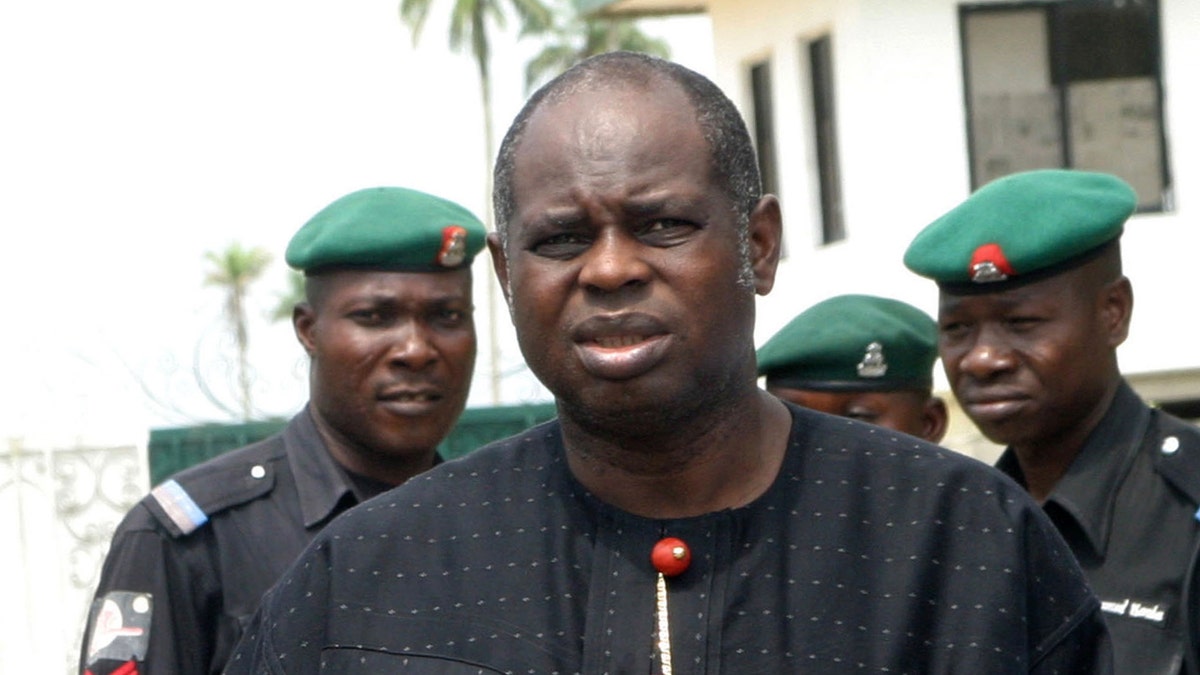
FILE - Bayelsa State Governor Diepreye Alamieyeseigha, centre, stands outside his house guarded by policemen in Yenagoa, Nigeria, in this file photo dated Sunday, Nov. 27, 2005. Presidential adviser Doyin Okupe said Wednesday March 13, 2013, that Nigeria's Council of States headed by President Goodluck Jonathan has pardoned the former political benefactor of the nation's president, who was convicted of stealing millions of dollars while serving as a state governor. The decision to pardon Alamieyeseigha was greeted with derision by activists who highlight Nigeria as having one of the world's most corrupt governments. (AP Photo, File) (AP2005)
LAGOS, Nigeria – Nigeria's foreign ministry summoned a top U.S. diplomat Friday night over an issue of national importance -- on Twitter.
At dispute are two messages sent Friday by the U.S. Embassy's Twitter account critical of an unconditional pardon given to a former governor convicted on corruption charges, a man who President Goodluck Jonathan only weeks earlier referred to as "my boss."
While the Twitter fight isn't likely to end the close relationship Nigeria shares with the U.S., one of its top customers for crude oil, it signals the sensitivity the government has over the pardon, which has enraged Nigerians tired of corruption's strangle-grip on the country. It also shows the growing power that social media have in Nigeria, and the rest of the world, to drive public debate.
The diplomatic spat began Friday morning with two short tweets published by the U.S. Embassy in Nigeria's capital, Abuja. The first said the U.S. was "deeply disappointed" over the pardon issued this week to former Bayelsa state Gov. Diepreye Alamieyeseigha. Alamieyeseigha was impeached and later pleaded guilty to corruption charges in Nigeria. Investigators said he used government money to acquire property in Britain and Nigeria worth more than $10 million.
The second tweet from the embassy simply said: "We see this as a setback in the fight against corruption."
While sounding largely benign, the criticism from the U.S. Embassy was uniquely direct. While then-Secretary of State Hillary Clinton roundly criticized the country during a visit to Abuja in 2009 over corruption and election fraud, local U.S. diplomats often strike a more conciliatory tone when speaking with the Nigerian government. The U.S. views Nigeria as a crucial ally in Africa, as it produces oil and provides peacekeeping troops for regional conflicts.
On Friday night, the Nigerian Ministry of Foreign Affairs issued a statement saying it was urgently calling James P. McAnulty, the U.S. deputy chief of mission, for a meeting. The statement called the U.S. remarks "undue interference and meddlesomeness," since the president had followed the provision of the Nigerian constitution granting him the power to issue pardons.
"The ministry finally expressed the hope that the embassy of the United States of America would henceforth desist from making unwarranted comments on Nigeria's internal affairs, which are capable of undermining the friendly relations that exist between them," the statement said.
Deb MacLean, a U.S. Embassy spokeswoman, declined to comment Friday night about Nigeria's remarks. The foreign affairs ministry singled MacLean out as the one responsible for making the comments on Twitter, though it was unclear who wrote the posts. Given the top-down structure of the U.S. Embassy, it is likely Ambassador Terence McCulley at least signed off on the message.
In Washington, State Department spokeswoman Victoria Nuland said earlier Friday that the "recent pardons of corrupt officials by the Nigerian government" are a setback for the U.S. support to strengthen the rule of law in Nigeria, "which is very important for the future of the country."
She hinted that the pardons could have repercussions on U.S. assistance programs.
"We have made clear to the Nigerians that this puts a question mark on the kinds of work that we've been trying to do with them," she said. No sanctions or punitive measures have been taken, she said, "but we're continuing to look at what's appropriate."
Alamieyeseigha served as governor of Bayelsa state, in the heart of Nigeria's oil-producing southern delta, from 1999, when the nation became a democracy, through 2005. He was arrested in London after more than $1 million in cash was found in his home there. Alamieyeseigha escaped British authorities -- Nigerian officials say he disguised himself as a woman -- and fled to Nigeria, where he ultimately stood trial.
Alamieyeseigha's impeachment brought Jonathan, a little-known marine biologist who served as his deputy, into power. Jonathan as recently as a few weeks ago referred to Alamieyeseigha as "my boss" during an event in Lagos.
Analysts and activists routinely refer to Nigeria as having one of the world's most corrupt governments. The continent's most populous nation, Nigeria likely lost more than $380 billion to graft between 1960 and 1999, authorities have said. Meanwhile, just more than 60 percent of Nigerians earn the equivalent of less than $1 a day, according to a study published by the country's National Bureau of Statistics.
Since the closed-door meeting Tuesday where Jonathan decided on the pardon, Nigerians have reacted with anger on Twitter and elsewhere over the decision. An editorial Friday in The Punch newspaper of Lagos simply said: "The situation is becoming hopeless."
It wrote: "Ours is a government being run by narrow minds and harder hearts."












































